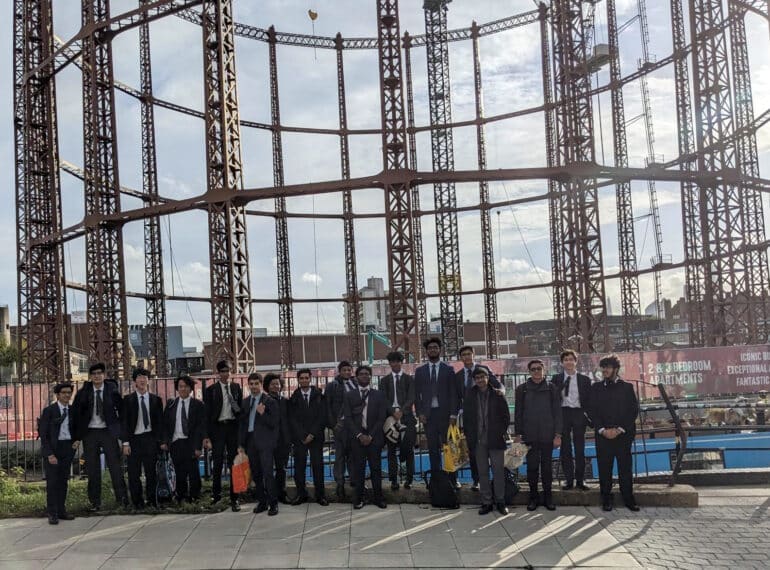
Year 12’s Technology students saw for themselves how start-up Batch.Works is using 3D printing as a true manufacturing technology by focusing on specialist design techniques and by automating its array of printers.
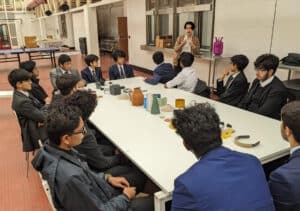 They learned how the company is pioneering a truly sustainable approach by recycling already-recycled materials to produce the plastic filament used by the printers.
They learned how the company is pioneering a truly sustainable approach by recycling already-recycled materials to produce the plastic filament used by the printers.
And the 17-strong group had the chance to present their own design projects to Batch.Works’s Chief Industrial Designer, Liam Hwang.
Head of Technology Michael Noonan said: “This visit provided the Year 12 cohort with unique and exciting insights into a company that is at the leading edge of sustainable design and manufacture, using heavily recycled materials to help its customers reduce their carbon footprint, and thus making the circular economy a reality.”
Now operating out of London Fields, Hackney, and from Amsterdam (and with plans to open a base in Rotterdam soon), Batch.Works was founded by designer Milo Mcloughlin-Greening and digital fabrication specialist Julien Vaissieres.
It first made waves in its sector during the pandemic when producing PPE for East London hospitals from its then-home in Bethnal Green.
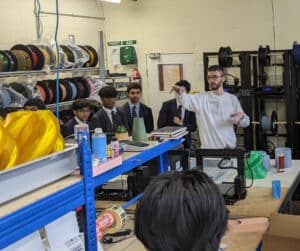 Recently awarded an innovation grant of £1.8m to create a network of manufacturing hubs that will use local recycled materials, Batch.Works is now investigating ‘urban mining’, the notion of turning waste streams into new products. It launched an equity crowdfunding campaign in September.
Recently awarded an innovation grant of £1.8m to create a network of manufacturing hubs that will use local recycled materials, Batch.Works is now investigating ‘urban mining’, the notion of turning waste streams into new products. It launched an equity crowdfunding campaign in September.
“Our students were absolutely thrilled to be told about the history, current works and future plans for the company by Dean Pankhurst, Design Co-ordinator at Batch Works,” said Mr Noonan.
“The company engages in specialist design for 3D printing, using the skills of industrial designers and project managers to enable a faster design-to-print lead time than most companies. Liam spoke about optimisation in design – how they alter designs to use ‘vase design’ principles so that no unnecessary bodies are created. As a result, unlike in other companies, at Batch.Works 3D printing can be used as a manufacturing technique, rather than only for making prototypes.
“Most impressive of all was that the company have themselves closed the loop of all the PLA filament they use, using recycling techniques on already recycled plastic: they are proud to use only 100% recycled materials in their work.”
During a tour, the boys first visited the company’s co-working room, where they saw technologies, collaborative techniques and methodologies similar to those which they use in their own product design work.
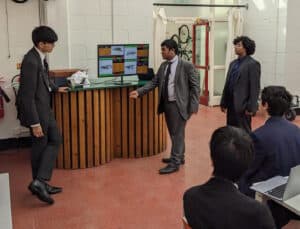 “Next, they were shown into the wildly impressive plant room by Dean and Liam,” said Mr Noonan. “The room contained 40 3D printers, some of which could print items as large as 1 metre square. Many of these were stacked on server cabinets, and the designers had impressively ‘hacked’ the G code [the most commonly used 3D-printing programming language] which drives the printers to turn them into automated 3D printing machines that could work around the clock. This means the rate at which the designers can prototype and manufacture is unrivalled.”
“Next, they were shown into the wildly impressive plant room by Dean and Liam,” said Mr Noonan. “The room contained 40 3D printers, some of which could print items as large as 1 metre square. Many of these were stacked on server cabinets, and the designers had impressively ‘hacked’ the G code [the most commonly used 3D-printing programming language] which drives the printers to turn them into automated 3D printing machines that could work around the clock. This means the rate at which the designers can prototype and manufacture is unrivalled.”
The boys were given an overview of the company’s projects and clients, from commercial giants such as M&S, to smaller medical companies and furniture businesses seeking sustainable design solutions. They were able to peruse prototypes that Batch.Works had created, including medical devices, personal hygiene products and headphones.
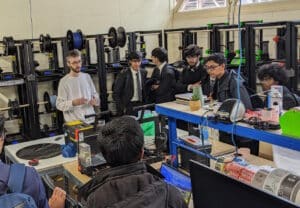 “It was at this point that the students began to ready themselves for their own presentations, as Liam had kindly agreed to take in the students’ presentations on their own recent vacuum cleaner projects. These, in fact, utilised many of the prototyping techniques with which he was familiar from his own studies in Product Design at the RCA and Central St Martins.”
“It was at this point that the students began to ready themselves for their own presentations, as Liam had kindly agreed to take in the students’ presentations on their own recent vacuum cleaner projects. These, in fact, utilised many of the prototyping techniques with which he was familiar from his own studies in Product Design at the RCA and Central St Martins.”
Each pupil had five minutes to present, followed by two or three minutes of questions and direct feedback from Liam on their designs.
During the presentations, all other students were linked into a scoresheet via MS Teams and could score their peers using a system of comparative assessment. Liam and Mr Noonan had casting votes. “Aniththan Kugathasan, Kiaron Lad and Aadish Praveen were crowned champions, earning a hearty round of applause for their superb presentation and an especially well-finished prototype.”
Liam told Mr Noonan: “The skills these students have in terms of presentation and CAD certification is very impressive – much closer to what we see from interns and graduates than from A-level students.”

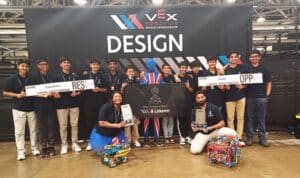 “In the VIQRC competition, too, our Year 9 teams, Omega and Constellation, shone very brightly. Omega secured the Build Award, recognising their robot’s outstanding construction and reliability, and Team Constellation added to QE’s growing trophy cabinet with another Design Award.”
“In the VIQRC competition, too, our Year 9 teams, Omega and Constellation, shone very brightly. Omega secured the Build Award, recognising their robot’s outstanding construction and reliability, and Team Constellation added to QE’s growing trophy cabinet with another Design Award.”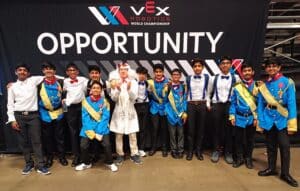 “But the best was yet to come,” said Mr Noonan. “Team Omega’s Build Award and Constellation’s Design Awards were fantastic achievements. As if that was not enough, both teams dazzled with their themed pit displays and costumes, winning the Costume Competition – a celebration of creativity and team spirit announced during the final rounds.”
“But the best was yet to come,” said Mr Noonan. “Team Omega’s Build Award and Constellation’s Design Awards were fantastic achievements. As if that was not enough, both teams dazzled with their themed pit displays and costumes, winning the Costume Competition – a celebration of creativity and team spirit announced during the final rounds.”


 Technology giant Intel asked Paarth to speak at the 2025 BETT UK after he took the national title in his age category in last year’s Intel AI Global Impact Festival. He won after impressing judges with his multi-lingual Navigate Ninja app, which uses storytelling and animated video to offer personalised learning to children with autism.
Technology giant Intel asked Paarth to speak at the 2025 BETT UK after he took the national title in his age category in last year’s Intel AI Global Impact Festival. He won after impressing judges with his multi-lingual Navigate Ninja app, which uses storytelling and animated video to offer personalised learning to children with autism. It was, he added, a “golden opportunity to exchange thoughts, ideas and suggestions with my fellow Intel presenters, technocrats, industry leaders, and renowned organisations”.
It was, he added, a “golden opportunity to exchange thoughts, ideas and suggestions with my fellow Intel presenters, technocrats, industry leaders, and renowned organisations”.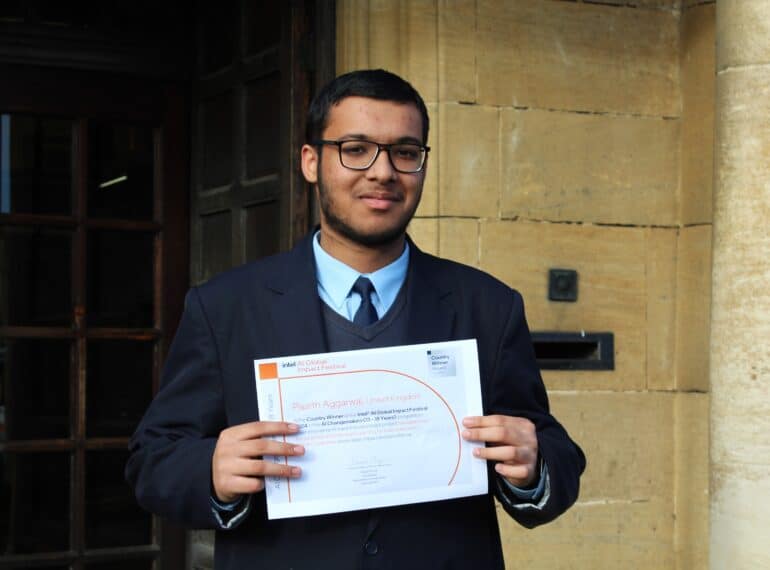
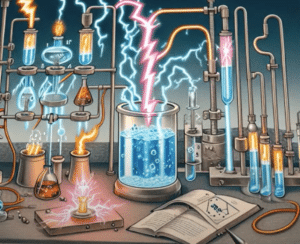 Parth took the national title in the AI Changemakers ages 13–18 category after impressing judges in the Intel AI Global Impact Festival 2024 with his multilingual GenAI-powered NavigateNinja app.
Parth took the national title in the AI Changemakers ages 13–18 category after impressing judges in the Intel AI Global Impact Festival 2024 with his multilingual GenAI-powered NavigateNinja app. He spent many hours researching, developing, and refining the project. His app provides unique content across different subjects, based on skill level; it aims to enhance comprehension and information retention.
He spent many hours researching, developing, and refining the project. His app provides unique content across different subjects, based on skill level; it aims to enhance comprehension and information retention.
 They learned how the company is pioneering a truly sustainable approach by recycling already-recycled materials to produce the plastic filament used by the printers.
They learned how the company is pioneering a truly sustainable approach by recycling already-recycled materials to produce the plastic filament used by the printers. Recently awarded an innovation grant of £1.8m to create a network of manufacturing hubs that will use local recycled materials, Batch.Works is now investigating ‘urban mining’, the notion of turning waste streams into new products. It launched an equity crowdfunding campaign in September.
Recently awarded an innovation grant of £1.8m to create a network of manufacturing hubs that will use local recycled materials, Batch.Works is now investigating ‘urban mining’, the notion of turning waste streams into new products. It launched an equity crowdfunding campaign in September. “Next, they were shown into the wildly impressive plant room by Dean and Liam,” said Mr Noonan. “The room contained 40 3D printers, some of which could print items as large as 1 metre square. Many of these were stacked on server cabinets, and the designers had impressively ‘hacked’ the G code [the most commonly used 3D-printing programming language] which drives the printers to turn them into automated 3D printing machines that could work around the clock. This means the rate at which the designers can prototype and manufacture is unrivalled.”
“Next, they were shown into the wildly impressive plant room by Dean and Liam,” said Mr Noonan. “The room contained 40 3D printers, some of which could print items as large as 1 metre square. Many of these were stacked on server cabinets, and the designers had impressively ‘hacked’ the G code [the most commonly used 3D-printing programming language] which drives the printers to turn them into automated 3D printing machines that could work around the clock. This means the rate at which the designers can prototype and manufacture is unrivalled.” “It was at this point that the students began to ready themselves for their own presentations, as Liam had kindly agreed to take in the students’ presentations on their own recent vacuum cleaner projects. These, in fact, utilised many of the prototyping techniques with which he was familiar from his own studies in Product Design at the RCA and Central St Martins.”
“It was at this point that the students began to ready themselves for their own presentations, as Liam had kindly agreed to take in the students’ presentations on their own recent vacuum cleaner projects. These, in fact, utilised many of the prototyping techniques with which he was familiar from his own studies in Product Design at the RCA and Central St Martins.”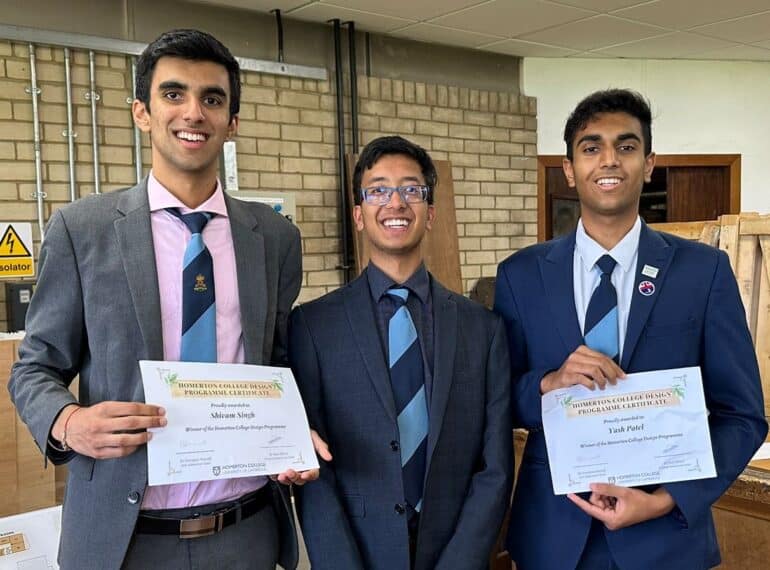
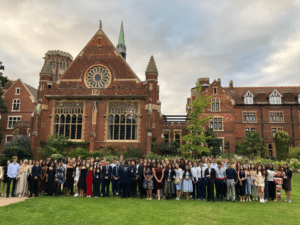 After being highly commended in the Homerton College Design Programme, Shivam Singh, Yash Patel and Om Patel were invited to a residential weekend, along with more than 200 other highly commended entrants of the design challenge and a parallel essay competition.
After being highly commended in the Homerton College Design Programme, Shivam Singh, Yash Patel and Om Patel were invited to a residential weekend, along with more than 200 other highly commended entrants of the design challenge and a parallel essay competition.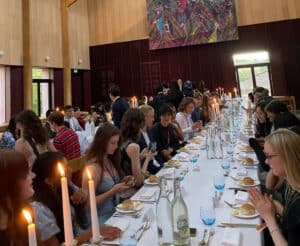 The QE trio, who are now in Year 13, designed a speaker to reduce noise pollution caused by machinery in the construction industry.
The QE trio, who are now in Year 13, designed a speaker to reduce noise pollution caused by machinery in the construction industry.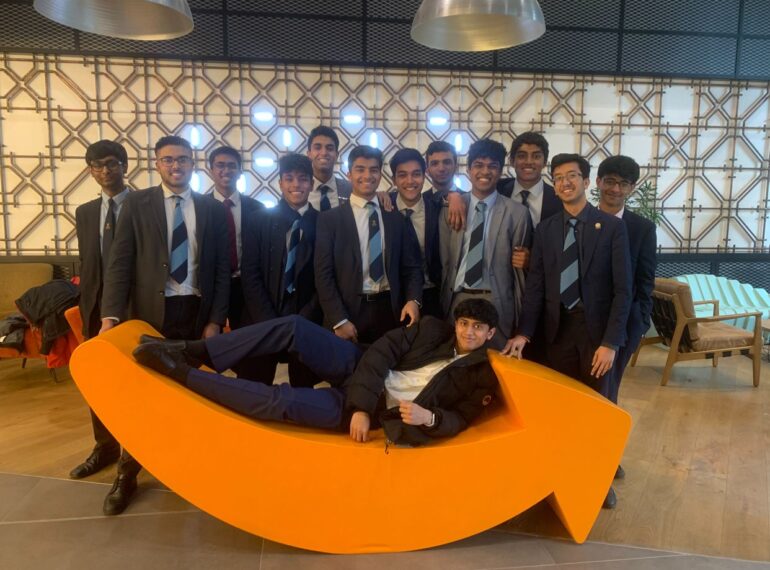
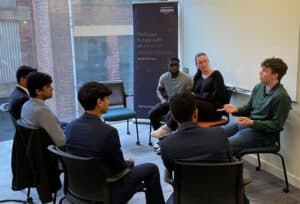 The boys were special guests at one of AWS’s monthly re:Purpose days, on which AWS staff are encouraged to get involved in projects and initiatives outside of their normal day-to-day work.
The boys were special guests at one of AWS’s monthly re:Purpose days, on which AWS staff are encouraged to get involved in projects and initiatives outside of their normal day-to-day work.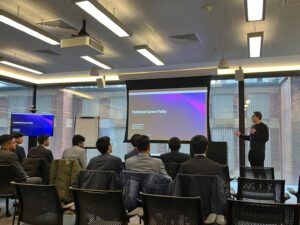 Enterprise Business Development Representative, Ella Cooper, who organised the day, together with her colleague, Juste Mena, said the day had seen the QE visitors “diving deep into careers in the cloud”.
Enterprise Business Development Representative, Ella Cooper, who organised the day, together with her colleague, Juste Mena, said the day had seen the QE visitors “diving deep into careers in the cloud”.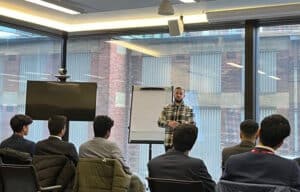 They also heard from Senior Manager Joe Welton and Solutions Architect, Jack Bark.
They also heard from Senior Manager Joe Welton and Solutions Architect, Jack Bark.